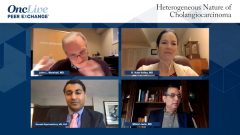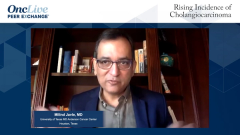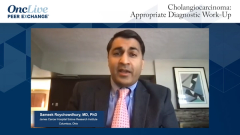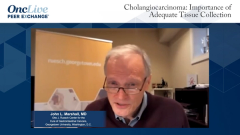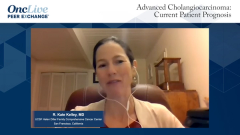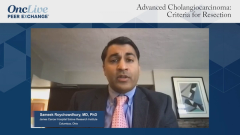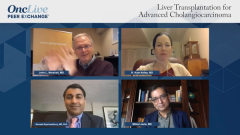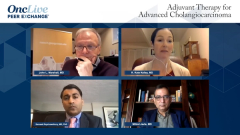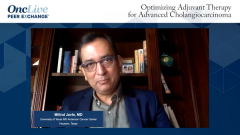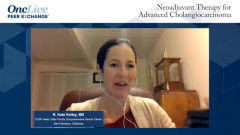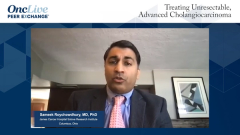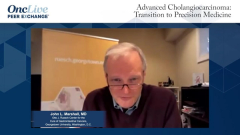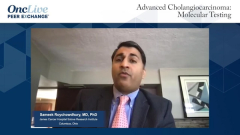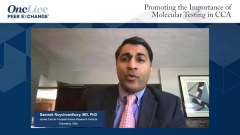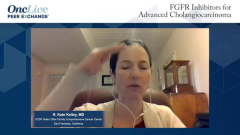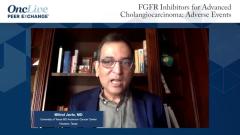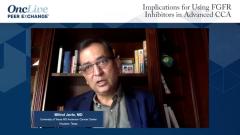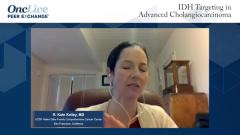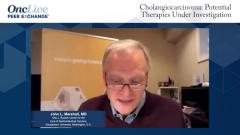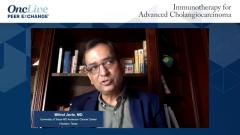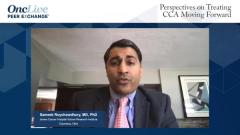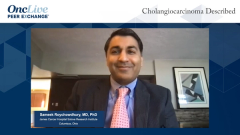
FGFR Inhibitors for Advanced Cholangiocarcinoma
R. Kate Kelley, MD, of the UCSF Helen Diller Family Comprehensive Cancer Center, comments on the rationale for treating patients with advanced cholangiocarcinoma with an FGFR inhibitor.
Episodes in this series

John L. Marshall, MD: Katie, can you give us the high-level walkthrough of the new medicines and targets? We’ll then drill down some of the data on that.
R. Kate Kelley, MD: Yes. Starting with the body of data on the FGFR inhibitors, it’s growing by leaps and bounds in a short window. Again, to refresh, the FGFR2 fusions or rearrangements are what we think are the driver event. We don’t know as much about point mutations or amplifications, so we’re talking about rearrangements.
John L. Marshall, MD: We all get these reports back, and it says you have an FGFR mutation. It’s like, no, that’s not it, right? It has to be these rearrangements?
R. Kate Kelley, MD: Right. The most data we have are for activating FGFR2 fusions or rearrangements in the grand scheme of translocation, so Venn diagrams for those definitions. Where you take part of the FGFR gene attached to a new promoter, those are driver-activating events, which are very targetable by these new inhibitors. Point mutations are much more heterogeneous; some of them may be targetable, but we just don’t know enough yet to have a broad statement on those. It’s the same with amplification. We’re talking about fusions or rearrangements or translocations, reconnections.
In that realm, the first FDA approval came with the drug pemigatinib in 2020, almost a year ago now. That’s based on the FIGHT-202 single-arm study that showed durable and pretty deep responses, with the waterfall plot showing a pretty substantial regression in almost all patients. With this drug, the uniformity of the regressions and durability led to an accelerated FDA approval, even in the absence of a randomized trial, and now we have an ongoing randomized phase 3 trial with pemigatinib vs GEM/CIS [gemcitabine/cisplatin] in the frontline setting.
Following close in the footsteps of pemigatinib are several other drugs. Pemigatinib is an ATP-competitive pan-FGFR inhibitor, FGFR1 through 3, greater than FGFR4, but targets FGFR2 among those. Another ATP-competitive inhibitor, infigratinib, formerly known as BGJ398, has also shown very similar phase 2 data in a single-arm study, that most patients have tumor regression. Partial or more responses occur in the high 20% to low 30% range and tend to be pretty durable, in the 7-month range, depending which data cut one looks at. Again, these are in patients with FGFR2 fusions or translocations.
What’s really getting interesting is that as we start looking at FGFR2 as a target, there are not just ATP-competitive inhibitors but also non–ATP-competitive covalent inhibitors that inhibit the kinase in a different location that have shown activity in resistance. One such example is the drug futibatinib, which has also shown activity—not only in FGFR inhibitor-naïve patients who have never had an FGFR inhibitor, but also in a subset of patients who have had prior therapy with infigratinib or pemigatinib who may have acquired a resistance mutation. That’s a whole other conversation topic, but the wave of the future may be nuancing this pathway and learning how to inhibit it sequentially like we have in EGFR-mutated lung cancer or ALK-fusion lung cancer. FGFR is a huge space and a rapidly growing body of data.
TRANSCRIPT EDITED FOR CLARITY


